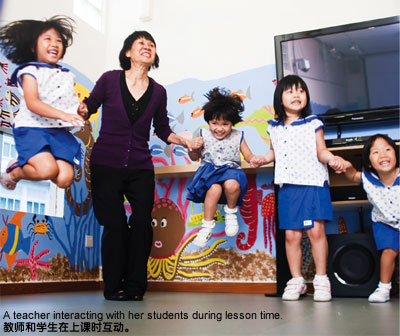 The Starting Well Index commissioned by the Lien Foundation was published in June 2012. Produced by the Economist Intelligence Unit, the Index ranked the performance of the early childhood sector in 45 countries. Singapore was ranked 29th. In July, Vital Voices for Vital Years was published. The report brought together 27 leaders in the Singapore early childhood sector, and provided insights into how the country can improve the industry. The Lien Foundation also conducted a parents’ survey on early childhood education in Singapore in August, because Mr Lee Poh Wah, Chief Executive Officer of the Lien Foundation, felt it necessary to hear from parents.
The Starting Well Index commissioned by the Lien Foundation was published in June 2012. Produced by the Economist Intelligence Unit, the Index ranked the performance of the early childhood sector in 45 countries. Singapore was ranked 29th. In July, Vital Voices for Vital Years was published. The report brought together 27 leaders in the Singapore early childhood sector, and provided insights into how the country can improve the industry. The Lien Foundation also conducted a parents’ survey on early childhood education in Singapore in August, because Mr Lee Poh Wah, Chief Executive Officer of the Lien Foundation, felt it necessary to hear from parents.
“If you want to seek reformation you need to help people see reality. That’s one reason why we embark on independent research. It’s a mirror, so you can have some honest self-reflection,” said Mr Lee.
The independent research has indeed awakened us from our slumber, and caused us to face reality. In this interview, Mr Lee shared his views and analysed the problems that the early childhood sector faces.
When Discussing Early Childhood Education, One Must Remember Social Inequality Too
Against the backdrop of the formation of the Early Childhood Development Agency and the government’s investment of $3 billion over the next five years in early childhood, Mr Lee had this to say, “This is a catch-up for us, because we have a lost decade of under-investment if you think about it. President Barack Obama, in his 2013 State of the Union Address, talked about having universal access to pre-school at the age of four in ten years’ time. Similarly, China is targeting to have 70 per cent of their children having at least three years of pre-school education by 2020.
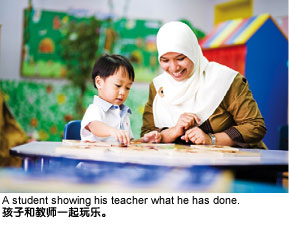 “Neuroscience research shows that it’s important to emphasise pre-school education. I like to tell pre-school teachers that they are in the human semi-conductor industry. They help to build the brain circuitry so the kid can be ready for life, not just Primary 1. Ninety per cent of the brain is formed by the age of five. This is when a lot of the social competencies are hardwired. The debate about nature versus nurture is incorrect. It should be about the nexus and interplay between them. Different environments can switch on or switch off different kinds of genes.” “Neuroscience research shows that it’s important to emphasise pre-school education. I like to tell pre-school teachers that they are in the human semi-conductor industry. They help to build the brain circuitry so the kid can be ready for life, not just Primary 1. Ninety per cent of the brain is formed by the age of five. This is when a lot of the social competencies are hardwired. The debate about nature versus nurture is incorrect. It should be about the nexus and interplay between them. Different environments can switch on or switch off different kinds of genes.”
Levelling the Playing Field
Giving children a leg up is especially needed if they come from disadvantaged environments, such as those from low-income or dysfunctional families.
“Poverty is like a disease that can impoverish the soul and damage the child’s disposition. The debate about pre-school is also a debate about inequality. The reality: intergenerational transmission of privilege and power at the top; intergenerational transmission of poverty and problems at the bottom. You can’t stop rich families from giving the best for their children, but what we can do is to help level up,” Mr Lee said.
In early 2013, the Lien Foundation partnered Care Corner to introduce the Circle of Care to the latter’s Leng Kee and Admiralty childcare centres. Circle of Care is a pilot model of childcare where educators, social workers and educational therapists look after children’s development in an integrated way.
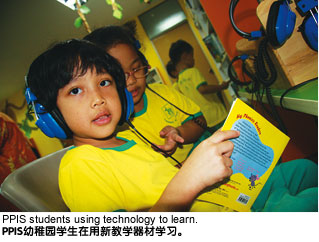 The four-year multi-pronged $1.8 million programme seeks to improve outcomes for all pre-school students and their families, including those at-risk, so that they can integrate confidently into school and community systems. Half of the funding will go towards hiring more teachers and providing teacher training, while the other half will be used to establish a comprehensive care team and to improve facilities at the centres. Well-respected early childhood expert Dr Khoo Kim Choo is the consultant for this project. The four-year multi-pronged $1.8 million programme seeks to improve outcomes for all pre-school students and their families, including those at-risk, so that they can integrate confidently into school and community systems. Half of the funding will go towards hiring more teachers and providing teacher training, while the other half will be used to establish a comprehensive care team and to improve facilities at the centres. Well-respected early childhood expert Dr Khoo Kim Choo is the consultant for this project.
The Care Corner centre in Leng Kee is an example of how poverty can set pre-school students way behind the starting line. 40 per cent of the children there come from families with a total monthly household income of less than $1,000. They often have troubled backgrounds and display disruptive behaviour, like pretending to smoke and bullying other kids as they mimic what’s happening at home.
“The childcare centre where these children spend 10 to 12 hours of their time can be a safe sanctuary for them to learn and form some good habits. Hopefully, their parents will see what an enriched environment can do,” Mr Lee said.
The Circle of Care programme not only helps the child, it also encourages positive and involved parenting through consultations with a social worker. “Parents are brought into the circle of care, as their role is integral to the child’s development and improvement,” Mr Lee added.
On what the Circle of Care hopes to achieve, Mr Lee said, “We are not setting ambitious goals. Rather, we’ll focus on the three Es. First, make sure it’s efficacious. Once it is efficacious, make sure it’s efficient. Once it’s efficient, extend it. We don’t want to circumvent the government, because these are issues that are a fundamental responsibility of the state.”
Successful Pilot Programme Scaled Up Nationally
In 2009, the Lien Foundation started a pilot project called Mission: I’mPossible with KK Women’s and Children’s Hospital and PAP Community Foundation (PCF) to help children with mild developmental needs in 22 PCF centres.
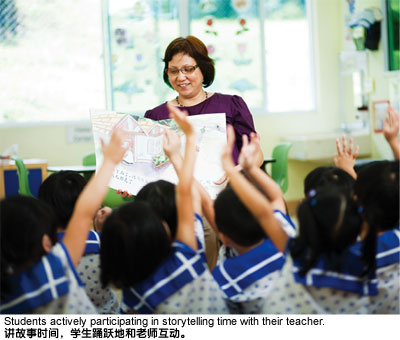 “In Singapore, children with severe developmental problems are well taken care of in special schools. However, about five to six per cent of children in each cohort have some form of learning difficulty and they’re not getting the help they need. To me, Mission: I’mPossible is also about how we can prevent unnecessary suffering. Think about the loss of self-esteem and confidence in the child, and parents’ and teachers’ frustration in not knowing what to do,” Mr Lee elaborated. “In Singapore, children with severe developmental problems are well taken care of in special schools. However, about five to six per cent of children in each cohort have some form of learning difficulty and they’re not getting the help they need. To me, Mission: I’mPossible is also about how we can prevent unnecessary suffering. Think about the loss of self-esteem and confidence in the child, and parents’ and teachers’ frustration in not knowing what to do,” Mr Lee elaborated.
The early intervention programme brought professional help into the classrooms and created a new breed of learning support educators to provide guidance for children with learning difficulties. It showed positive results and underscored the need for an accessible and affordable nationwide programme to help pre-school students with developmental needs catch up. In 2012, the government scaled it to about a hundred more centres in Singapore.
Parallels between Starting Well and Ending Well
Mr Lee is of the opinion that the problems the early childhood sector faces must be viewed from all aspects of society. He shared how he has in his work found similarities between end-of-life care and early childhood education. “Pre-school children and the terminally ill are very similar. These are people we love — vulnerable, voiceless, and dependent on family members to decide for them. And the services they need straddle different parties. There’s presently a lot of bureaucracy and issues in these sectors.The real diseases in Singapore are apathy, complacency and mediocrity that come with wealth and success.”
Combating the inertia also means addressing the efficiency level of pre-schools. “Pre-schools are like enterprises, and right now, not all of them are efficient, and this is not just a matter of having enough student numbers. Many operators are struggling to meet all the functions of a pre-school and keep it afloat. If expertise like those from SPRING Singapore could be sent to pre-schools to reconfigure the workflow, streamline processes and improve productivity using technology, teachers can better focus on teaching. These small things can be transformative,” Mr Lee said.
Four Lows and Five Highs
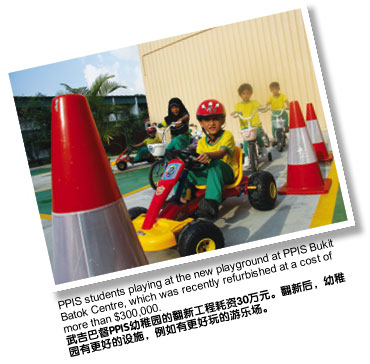 Mr Lee thinks that the most crucial and complex problem facing the early childhood sector today is the quality of teachers. Mr Lee thinks that the most crucial and complex problem facing the early childhood sector today is the quality of teachers.
“The sector presently suffers from four lows resulting in five highs. The four lows are: quality, status, pay and prestige — resulting in the five highs of turnover rate, attrition rate, shortages of teachers, frustration on the part of operators and anxiety in children. These issues not only affect the quality of early childhood education, they also become obstacles to efforts for improvement. For example, high attrition stalls capacity and fritters away the money spent in training, and breeds an unstable teaching environment for the children.
“In addition, the dismal status of pre-school teachers and their systemic under-qualification prevents the sector from attracting good talent. I don’t think we are getting enough of the right kind of people to be pre-school teachers. There should be an obsession about recruiting, developing and retaining teachers, rather than lowering the entry level of early childhood educators.”
Mr Lee also revealed that because so many of them never cross the five-year hurdle, there is a missing layer of experienced, long-serving teachers. “There is high frustration on the part of pre-school operators because of HR (human resource) issues. If you have HR issues, you are very vulnerable — you cannot respond to challenges or opportunities, or even scale up,” Mr Lee said.
He shared his personal experience of the impact of high teacher attrition and turnover. “I placed my daughter in a private playgroup for a couple of hours every day when she was two years old. For the one year that she was there, there was more than a 100 per cent teacher turnover rate. And I could see the separation anxiety and frustration in the children. At the end of the day, a child needs stable and secure relationships with caring adults as teachers are like surrogate parents.”
In an opinion piece he wrote for TODAY in 2012, Mr Lee highlighted the problems teachers faced: “The employer of primary and secondary school teachers, the Ministry of Education (MOE), recruits from the top 30 per cent of each cohort and selects so stringently that only 14 per cent of some 18,000 applicants are successful every year.”
During the interview, Mr Lee suggested that the MOE could consider recruiting an additional six per cent of potential pre-school teachers. “Why can’t we change it to 20 per cent? Take in another six per cent and that translates to about 1,000 more teachers. The graduate trainees could be from any discipline, it doesn’t matter. Put them on a course, and when they graduate, they can teach in either pre-schools or primary schools. I think it is better to find high quality people than to set the bar too low.
“We need buy-in from the MOE and the NIE (National Institute of Education) to create a career pathway that intersects primary schools and pre-schools. The MOE’s investment in high quality graduates for the early childhood sector can enhance the quality of teaching.”
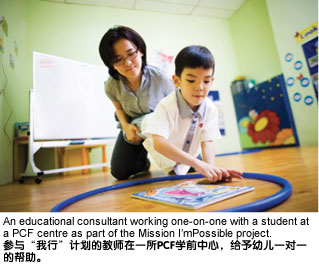 The Foundation sees its role as complementing the government’s efforts to improve the early childhood sector. The Foundation sees its role as complementing the government’s efforts to improve the early childhood sector.
“I hope the relevant government agencies will have some answers on the problem of teacher quality. I hope they can dream, design and deliver a first class HR system, hopefully over the next ten years, so that pre-school teachers can achieve some sort of parity with teachers from mainstream schools.
“Dr Lien Ying Chow founded the Foundation to focus on education, among other things. I hope to complement the government and sector’s efforts — spot and tackle the gaps that are hard to deal with, or attempt programmes and solutions that the Foundation can nimbly put together.”
The Lien Foundation’s Work in the Early Childhood Sector
In 2005, the Lien Foundation partnered the Young Women’s Christian Association (YWCA) to launch Yes U Can…… Be Included! The project aimed to help children with mild developmental needs assimilate in a mainstream pre-school setting. This project was to set the foundation for the highly successful Mission: I’mPossible in 2009.
The Foundation subsequently brought the YWCA together with their Muslim counterparts at Persatuan Pemudi Islam Singapura (PPIS), also known as the Young Women Muslim Association, on a joint training and exchange programme between the two organisations.
“Even though the two organisations share similar missions, they have never talked to one another. We brought them together on joint training programmes, student and teacher exchanges. We also helped to redevelop a PPIS kindergarten at Bukit Batok. These two organisations didn’t get much government funding as they were non-secular. They deserved our support as they serve a niche in the community,” Mr Lee said.
Mr Lee grew more aware of poor families and the kinds of situation the children are faced with. “I would hear stories like that of a mother bottle feeding her young child Coca Cola. I also saw poverty and pockets of social deprivation. To help these families, we put in place a parenting programme scheme at PPIS. The Lien Foundation would pay the needy children’s school fees and their parents were required to attend parenting workshops during the weekends.”
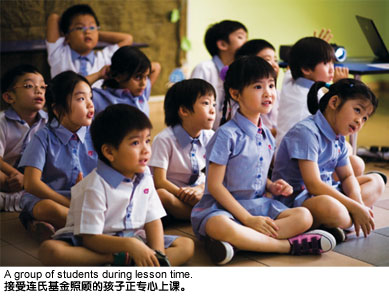 Another key project that the Lien Foundation embarked on in 2010 was aimed at raising capacity and efficiencies in 11 YWCA pre-schools through the use of information technology (IT). Another key project that the Lien Foundation embarked on in 2010 was aimed at raising capacity and efficiencies in 11 YWCA pre-schools through the use of information technology (IT).
“This was a pretty successful IT project, but we went through a very painful process. We gave each teacher an iPhone with purpose-built apps which they used to create lesson plans and record students’ information, among other things. When teachers had meetings with parents, they were able to access the student’s record and data right away for discussion. The use of IT also enhanced their image and professionalism. The students’ learning was enhanced through IT tools like the interactive whiteboard, Wii Games and a dedicated computer lab,” Mr Lee said.
Harnessing IT resources for pre-schools also gave Mr Lee valuable insights into HR-related issues in the early childhood sector. “Together with another foundation, we wanted to introduce cloud computing to 60 pre-schools to increase capacity and efficiency. At the end of the day, we managed to deploy it only at eight pre-schools. Why? HR problems such as high turnover, heavy workloads and resistance to change came into play. Some pre-schools had teacher turnover rates of up to 40 per cent. So we were barking up the wrong tree.
“My conclusion is that unless you address the HR issue, the problems will continue to fester. The Foundation can mount many programmes, but if the fundamental problems are not addressed, we would just be assuaging the symptoms.”
Future Plans of the Lien Foundation
“If I were to have a dream pre-school — it would be the one I saw on television — a place in Japan called Fuji Kindergarten. The design is fantastic; it looks like a doughnut, and they incorporate the trees they preserve. There is a wooden track on top where children can run about. The whole space — the look and feel — integrates the classroom space, the play area and childcare facilities. How I wish I was a kid so that I could play there.
“Singapore is a city in a garden and we have many parks. I think our green environment and children exist in a natural symbiosis. Think of the word ‘kindergarten’. Why not build kindergartens inside the parks?”
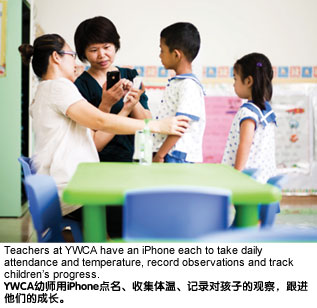 While Mr Lee’s dream pre-school may not be within reach yet, he told us that the Lien Foundation is supporting the development of two model pre-schools with an operator that will be up and running next year. “Their staff have travelled to other countries to see and learn from great pre-schools. In the new pre-schools, there will be dedicated workspaces for the teachers, and a lot of thought has gone into creating an ideal environment for the children, teachers and even parents.” While Mr Lee’s dream pre-school may not be within reach yet, he told us that the Lien Foundation is supporting the development of two model pre-schools with an operator that will be up and running next year. “Their staff have travelled to other countries to see and learn from great pre-schools. In the new pre-schools, there will be dedicated workspaces for the teachers, and a lot of thought has gone into creating an ideal environment for the children, teachers and even parents.”
The Lien Foundation has plans to extend its engagement with a wider community that includes new influencers and opinion makers in the private sector. Mr Lee is excited to explore how the Foundation can harness the strength of corporations to amplify the cause of the early childhood sector.
“I see it as coalition building that strategically taps on the shared values of corporates and the needs of the sector. Corporates may have CSR (corporate social responsibility) interests that are aligned with the cause. My interest is to bring different parties together to tackle the problems for the better good of society, especially our young children. We are still identifying the companies we would like to invite to the coalition.”
In addition to his work in the early childhood sector, Mr Lee is involved with water sanitation and end-of-life projects. Although he is only 43 this year, he has had a personal encounter with death. Six months after joining the Lien Foundation in 2005, Mr Lee was diagnosed with late stage colon cancer. But despite having to undergo a major operation and chemotherapy, his tenacity saw him working throughout his treatment. The experience has given him greater empathy and motivation in his work.
“The whole episode has been a blessing. It has changed my perspective and added value and new insights into my professional work. I shared my story in The Straits Times because sometimes we need to remove our armour and show our vulnerabilities to give strength to the work we do.
“A good life, like a good story, should start and end well.”
|